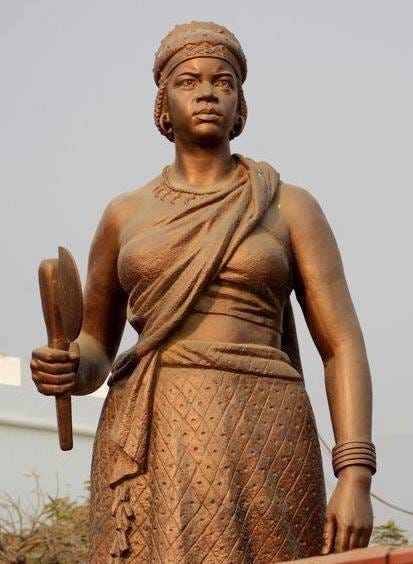Today In Black History
Nzinga, 17th-Century Warrior Queen and "Mother" of Angola
Issue #587 Today In Black History, Wednesday, May 1, 2024
A full podcast of the audio for the eight weekly W.A.S. posts from the previous week will be published every Tuesday (starting May 7) on Apple Podcasts and Spotify Podcasts.
Please also scroll to the end of this post for other ways to financially support We Are Speaking.
We appreciate your support!
Today’s Black History WOW!
Queen Nzinga was a powerful and influential ruler in 17th-century Africa, known for her strategic military tactics and diplomatic skills in resisting Portuguese colonization in the region. Born in 1583 into the ruling family of Ndongo in the Kingdom of Ndongo (present-day Angola), Nzinga was the daughter of King Kiluanji Kia Samba.
Nzinga received military and political training as a child, and she demonstrated an aptitude for defusing political crises as an ambassador to the Portuguese Empire. In 1624, she assumed power over Ndongo after the death of her brother Mbandi.
She ruled during a period of rapid growth of the African slave trade and encroachment by the Portuguese Empire in South West Africa. It was the growing demand for this human labor in New World colonies such as Brazil that ultimately led Portugal to seek military and economic control of this region.
In 1641, she allied with the Dutch West India Company which had captured Luanda from the Portuguese. Between 1641 and 1644, Njinga was able to reclaim large parts of Ndongo. Alongside the Dutch, she defeated the Portuguese in several battles but was unable to take the Fortress of Massangano. In 1648, the Portuguese recaptured Luanda, with the Dutch leaving Angola. Njinga continued to fight the Portuguese until a peace treaty was signed in 1656.
Nzinga focused on developing Matamba as a trading power by capitalizing on its position as the gateway to the Central African interior. By the time of her death in 1663, Matamba was a formidable commercial state that dealt with the Portuguese colony on an equal footing.
Nzinga died in her sleep on the morning of 17 December. She was buried with great aplomb by Catholic and Mbundu traditions. Ceremonies were held across Matamba and in Luanda, where both the Portuguese and Mbundu populations held services in her honor.
Today, she is remembered in Angola as the Mother of Angola, the fighter of negotiations, and the protector of her people. She is still honored throughout Africa as a remarkable leader and woman, for her political and diplomatic acumen, as well as her brilliant military tactics.
Nzinga is a leadership role model for all generations of Angolan women. Women in Angola today display remarkable social independence and are found in the country's army, police force, government, and public and private economic sectors. Nzinga was embraced as a symbol of the People's Movement for the Liberation of Angola during the civil war.
Today In Black History
In 1863, the Confederate Congress passed a resolution that branded Black troops and their officers as criminals, dooming captured Black soldiers to death or slavery.
In 1867, Howard University, named for General Oliver O. Howard, opened.
In 1867, Reconstruction began in the South by registering Black and white voters. By the end of October, Black voters constituted a majority in Alabama, Florida, Louisiana, Mississippi, and South Carolina.
In 1941, Asa Philip Randolph issued a call for 100,000 Blacks to march on Washington D.C. to protest discrimination in the armed forces and war industries.
In 1946, former federal judge William H. Hastie was confirmed as the governor of the Virgin Islands, becoming the first African American to govern a U.S. state or territory since Reconstruction.
In 1946, Emma Clarissa Clement of Louisville, Kentucky became the first Black woman to be named “American Mother of the Year” by the Golden Rule Foundation.
In 1950, Gwendolyn Brooks became the first Black person to a Pulitzer Prize, which was won for her poetry book, “Annie Allen.”
In 1991, Marcelite J. Harris became the first Black female general of the Air Forces when she was promoted to Brigadier General.
In 1997, Alexis M.Herman became the first Black Secretary of Labor when she was appointed by President Bill Clinton.
The “Comments” feature has been disabled. Instead, let’s discuss these facts in our community on Substack Notes. You can also read other Substack publications without subscribing to them when you join Notes.
This post is free to read. To financially support “We Are Speaking” for no more than $5 per month, please subscribe at the paid level. You will receive a 7-day FREE trial!
Independent Authors and Creative Professionals: Branding and Marketing Courses and Networking Groups are available in the GCC Branding and Marketing Academy!
Pam’s Business Books and Keith’s SciFi Books are available for purchase here!







